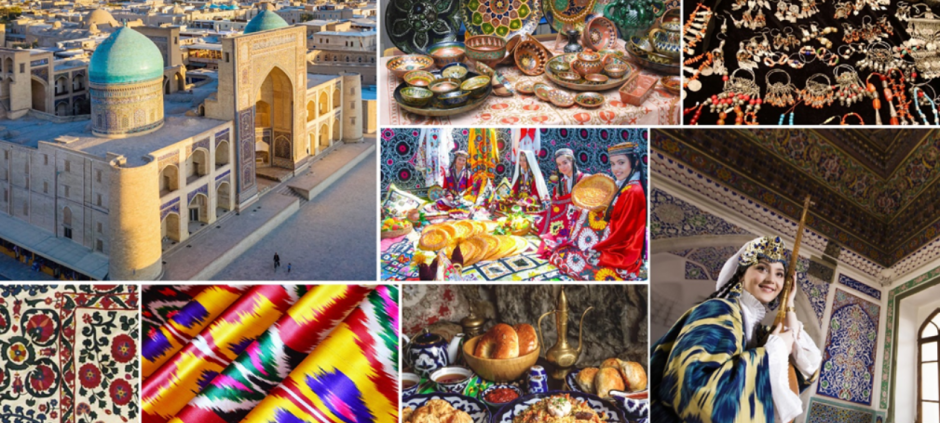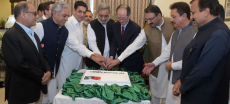In recent decades, cultural diplomacy has become an important element of the foreign policy of many countries, including Uzbekistan. As a result of ongoing efforts, we are witnessing an active expansion of cooperation with foreign states, the establishment of sincere and respectful relations with international organizations and diplomatic missions, and the systematic implementation of joint spiritual and educational work.
Our country possesses an ancient history, a rich culture, and centuries-old traditions and customs. Leveraging its cultural potential in foreign policy has become one of the key aspects of building a positive image of the Republic, enhancing its international authority, and efficiently addressing both internal and external political challenges. This is why our country actively employs cultural diplomacy in its foreign policy, which is based on mutual respect, the exchange of values, art, and traditions. Experts in international relations describe cultural diplomacy as a strategic tool that forms long-term contacts between peoples and influences the perception of a country on the global stage.
International organizations play a special role in advancing cultural diplomacy. For example, on May 21 in Budapest (Hungary), an informal summit of the Organization of Turkic States (OTS) was held, with a focus on strengthening cooperation in promoting the priceless cultural and historical heritage of Turkic peoples.
Also Read: COAS Aims To Boost Defense Relations With Uzbekistan
Uzbekistan joined the organization in 2019 and has since regularly put forward initiatives not only in political and economic cooperation but also in the area of cultural and humanitarian collaboration. Among the key objectives are the preservation and promotion of Turkic heritage, the advancement of Turkic languages, and support for cultural exchanges and joint events.
It is important to emphasize that the foundation of the OTS lies in a shared language, religion, and historical and cultural ties, which help amplify the voices of member states on the international stage and promote the values of their peoples. It is no coincidence that among the organization’s priorities, in addition to fostering trust and friendship among members, are the expansion of cooperation in science, education, culture, and tourism.
Under the OTS umbrella, six organizations operate, two of which serve as platforms for the development of cultural and humanitarian relations. These include the International Organization of Turkic Culture (TURKSOY), headquartered in Ankara, Turkey, established on July 12, 1993, to revive cultural and humanitarian ties among Turkic-speaking peoples. TURKSOY is a scholarly and educational organization that promotes Turkic culture through various international projects. It highlights key cultural contributions by commemorating significant figures from Turkic culture annually. Among its important initiatives is the annual naming of a cultural capital of the Turkic world from among member countries. The jewel of our country, Khiva, has already been honored with this prestigious title.
Another organization working under the auspices of the OTS and focusing on cultural initiatives is the Turkic Culture and Heritage Foundation, headquartered in Baku, Azerbaijan. It was established at the initiative of the Azerbaijani side in August 2012 to develop projects aimed at reviving, developing, and promoting the culture and historical heritage of the Turkic peoples.
Promoting important cultural and humanitarian initiatives through affiliated OTS structures (TURKSOY, TurkPA, the International Turkic Academy, and the Turkic Culture and Heritage Foundation), with an emphasis on Uzbekistan’s special historical role in the Turkic world, is one of the priorities of our country’s foreign policy. This active approach is no coincidence: on the ancient land of Uzbekistan lived great scholars and thinkers, writers and theologians who made tremendous contributions to the development of global civilization. Al-Khwarizmi, Ahmad al-Fergani, Abu Rayhan al-Biruni, Ibn Sina, Mirzo Ulugbek, and many others left a brilliant mark in history, and the works of the genius Alisher Navoi still serve as a unifying force within the Turkic world.
President Shavkat Mirziyoyev, speaking at the informal OTS summit on March 31, 2021, especially emphasized: “Special attention should be paid to the deep study of our peoples’ invaluable contributions to the development of secular sciences and their rich cultural heritage, the conduct of various research, and their promotion worldwide.” In the six years since joining the OTS, Uzbekistan, together with the organization’s Secretariat, has held a number of major events: the international conference “The Role of the Kokand Khanate in the Development of Statehood and Cultural Heritage of the Turkic Peoples,” the first Forum of Young Entrepreneurs with over 250 young businesspeople from OTS countries, and the 4th Forum of Young Leaders in Bukhara, which was named the first Youth Capital of the Turkic World. At Uzbekistan’s initiative, the International Alisher Navoi Prize for contributions to unity in the Turkic world was established.
The year 2022 proved particularly active, as our country hosted over ten major events, including the First Meeting of Ministers of Agriculture and the Turkic Agroforum. In December 2023, Uzbekistan successfully held the international conference “Jadids: National Consciousness, Ideas of Independence and Statehood.”
Tashkent supports a comprehensive strategy to bring OTS countries closer together by relying on shared historical roots and a rich cultural heritage, and it aims to develop projects in education, innovation, and tourism. One such example is the implementation of the Union of Turkic Universities and the Orhun Exchange Program within the OTS framework. These initiatives enhance academic mobility and strengthen scientific cooperation.
Today, OTS countries possess tremendous institutional and practical potential for expanding multifaceted cooperation. Moreover, initiatives in the cultural and humanitarian spheres provide opportunities to showcase national achievements and heritage, while jointly creating platforms for cultural dialogue and knowledge exchange. The initiatives put forward by Uzbekistan within the OTS are constructive and are not attempts at dominance or the creation of “bloc alliances.” Such a pragmatic and balanced policy by Uzbekistan opens new dimensions for the development of regional and international cooperation, laying the foundation for mutually beneficial relationships with foreign partners in the fields of economy, trade, industry, investment, and business.
The development of interstate relations within the Organization of Turkic States demonstrates that ethnic, linguistic, and geographic commonality serves as a solid foundation for building strong political, economic, and cultural ties. Based on these shared motivations, countries in the region are striving to establish reciprocal foreign trade communications as a priority, provide mutual support in accessing markets and transit routes, and resolve other related issues.
The initiatives proposed by President Shavkat Mirziyoyev at OTS summits, aimed at promoting Uzbekistan’s culture and the priceless heritage of its ancestors, who are the pride of the entire Turkic world, deserve particular attention. In speaking of great poets such as Jalaluddin Rumi, Yunus Emre, Yusuf Khass Hajib, Nizami Ganjavi, Magtymguly, Firoghi, and BoborakhimMashrab, the President noted that the legacy of these cultural figures is a shared spiritual treasure of all Turkic peoples.
Speaking recently at the informal summit in Budapest, President Shavkat Mirziyoyev emphasized: “The in-depth study and global promotion of the legacy of our great ancestors, who made a tremendous contribution to world science and culture and are our pride, is an honorable and responsible task for all of us. In our efforts to develop science and expand educational opportunities for the younger generation, we have enshrined in the Turkic World Charter the high spiritual principle: ‘There is no salvation except through knowledge.’” The President also introduced new initiatives. One of them is the establishment of the International University of Turkic States in Tashkent. It is expected that leading professors and scholars from Turkic countries will work at this university, contributing significantly to intellectual potential and creating new opportunities for youth.
It is important to understand that over the past few decades, the global cultural landscape has changed significantly, increasing the demand for the development of cultural and humanitarian ties. In today’s world, where economic and political tensions often arise, it is culture that holds the greatest potential to overcome differences, enhance mutual understanding, and improve international relations. The promotion of cultural diplomacy principles is essential for strengthening ties between countries and supporting global sustainable development. It contributes to the preservation and promotion of heritage, facilitates the exchange of experience and knowledge, and creates new opportunities for creative development and mutual understanding.











